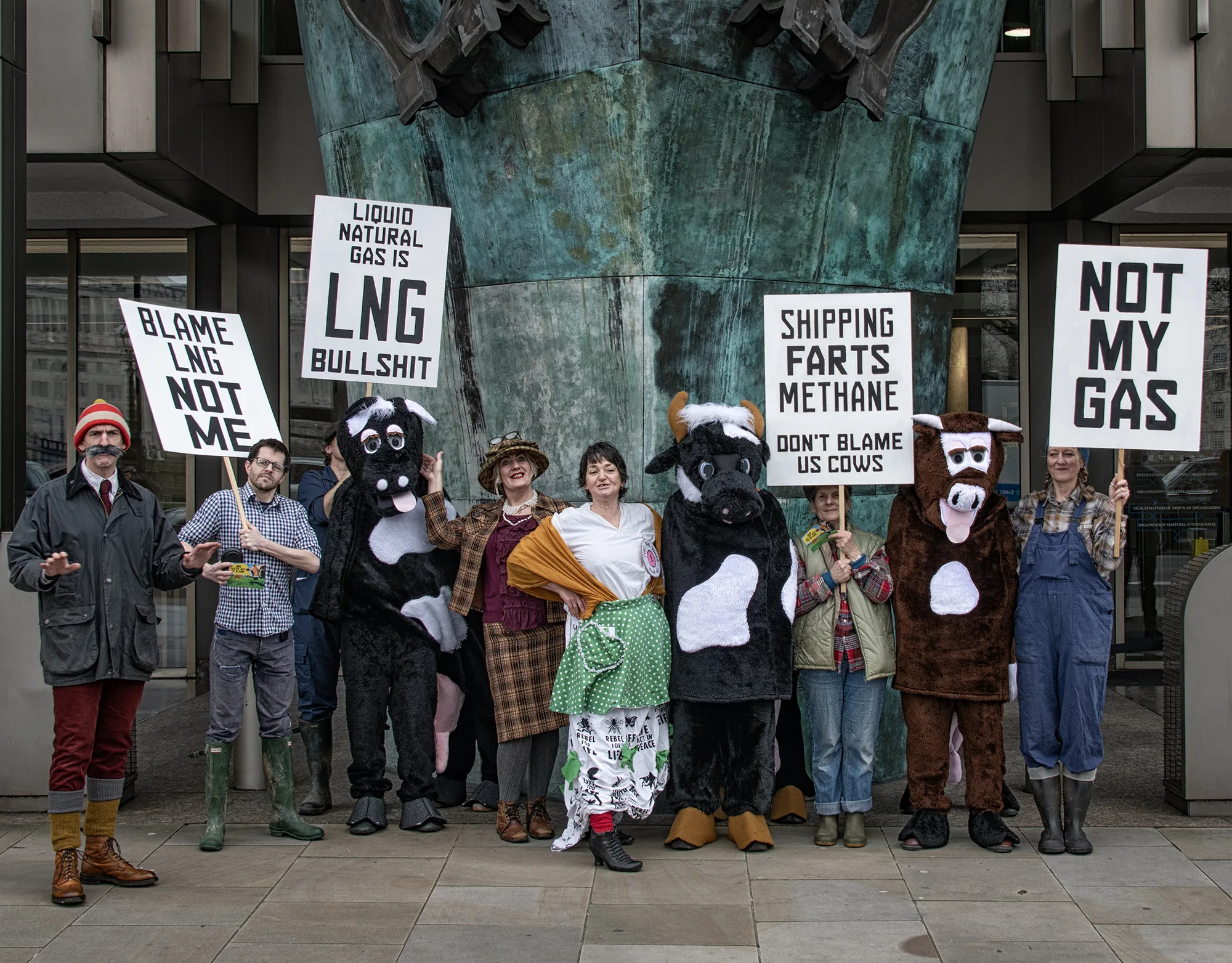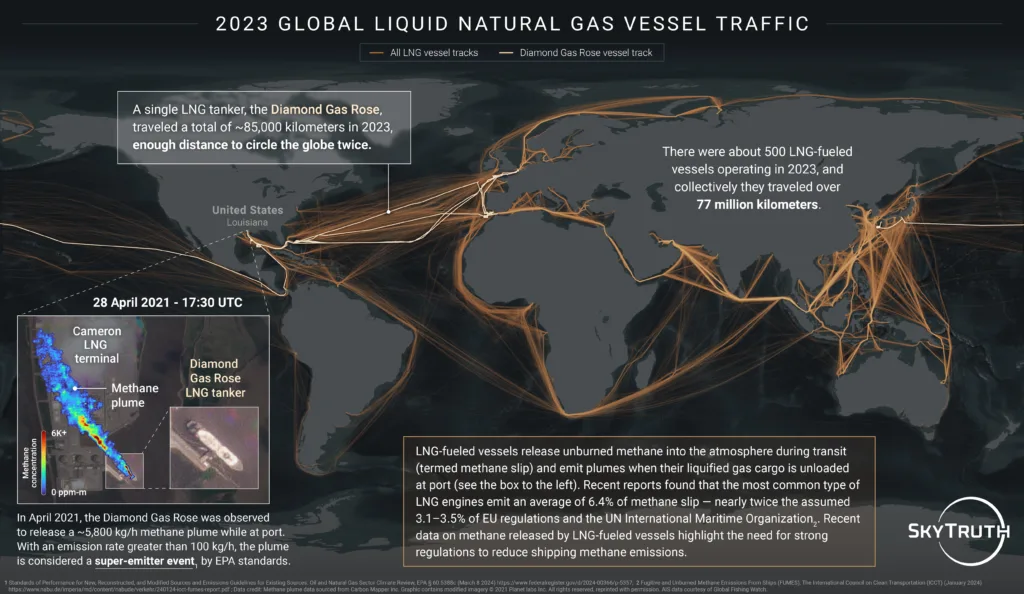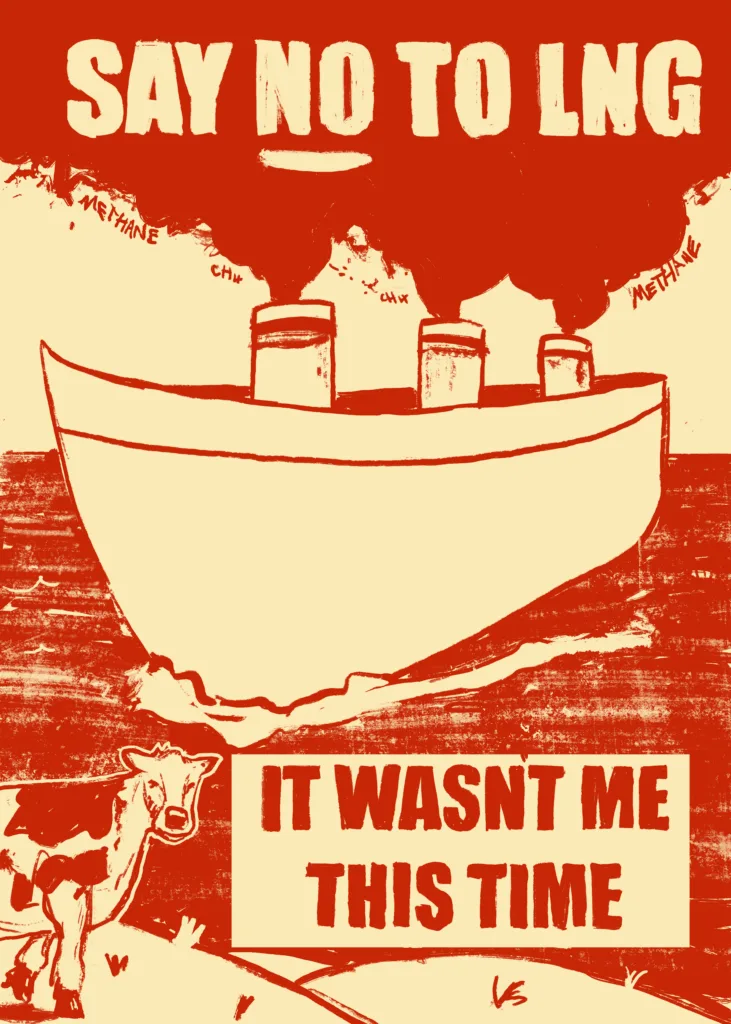The International Maritime Organization (IMO) and the Gaslight of Liquefied Natural Gas (LNG)
Coordinated protests erupted in the Netherlands, UK, France, and Canada in the lead up to the International Maritime Organization (IMO) meetings starting today.

PRESS RELEASE
March 18, 2024 – Coordinated protests erupted in the Netherlands, UK, France, and Canada in the lead up to the International Maritime Organization (IMO) meetings starting today. We are underscoring the urgency of unveiling the deceptive practices around Liquefied Natural Gas (LNG), which is gaining popularity in the shipping industry as a ‘clean’ fuel.
In the European Union alone, consumption of Liquefied Natural Gas (LNG) by ships has doubled from 2.2 million tonnes (Mt) in 2018 to 4.4 Mt in 2022. This surge in uptake is a result of deceptive marketing that is promoting LNG as an alternative, clean fuel. LNG proponents are misleading the maritime sector and all of us – this is the gaslight of LNG.
The Gaslight of Liquefied Natural Gas
Tactics reminiscent of gaslighting – a form of psychological manipulation – are being used by LNG proponents to sow doubt and confusion around the use of LNG as a marine shipping fuel. They selectively fund research and cite studies supporting their claims, while discrediting those highlighting LNG’s environmental and social risks. They also publicly dismiss dissenting voices from communities and experts by labeling them “alarmists” or “obstructionists.”
The Truth about LNG and Methane
LNG is more accurately described as liquefied fossil methane gas – LNG is composed of 85-95% methane. Methane is a strong greenhouse gas with about a 12-year atmospheric lifetime compared to centuries for CO2. Even though methane does not stick around for long, it is a potent greenhouse gas (GHG) that absorbs 84 times more energy than CO2 in the atmosphere.
Methane emissions not only exacerbate global warming in the short term but also decrease air quality. Additionally, increased demand for LNG — including in the maritime sector — leads to adverse land-based impacts, such as polluted drinking water, reduction in crop production, and higher premature death rates.
Current Status of LNG and Shipping
Between 2012 and 2018, methane emissions from LNG-fueled ships grew by 150 percent (Fourth IMO GHG Study 2020). One of the challenges of methane emissions associated with LNG vessels is its invisibility. The campaign partnered with SkyTruth to utilize mapping technology to illustrate the surge in LNG vessel traffic (see map below).

Real-world methane emissions from shipping also indicate that the sector’s contribution to climate change is larger than previously estimated. Despite the negative climate and environmental impacts, the shipping industry is projected to witness further growth in LNG demand, with the anticipated addition of about 160 to 500 new LNG-fueled vessels annually until 2030.
We Need Strong Methane Regulations at the IMO
According to the IPCC (AR6), addressing the climate emergency and its devastating impacts on people requires urgently tackling methane emissions in the near term. LNG proponents are gaslighting policymakers by strategically diminishing the real size of LNG’s climate and health impacts, jeopardizing a liveable future on this planet.
The International Maritime Organization (IMO) is the United Nations body regulating international shipping. Currently, no specific international regulations exist for methane emissions from ships. However, several opportunities exist to comprehensively integrate methane into the IMO’s regulatory framework during the upcoming 81st Marine Environmental Protection Committee (MEPC81) meeting scheduled from March 18 to 22.
Calls for Action at the IMO This Week:
- The IMO’s Life Cycle Assessment (LCA) Guidelines: to ensure accountability for the real size of the shipping sector’s methane footprint, the default emission factor for methane slip must be 8.5% instead of the IMO’s current 3.5%.
- GHG Fuel Standard: methane must be meaningfully included as a medium-term solution in the IMO GHG Fuel Standard being developed.
- IMO’s GHG Reduction Strategy: to move beyond a CO2-centric approach, efficiency standards and the price of emissions must include other GHGs such as methane.
Quotes
“Global shipping faces a critical moment in addressing the climate crisis. We must choose between false solutions like LNG or a true zero-emissions way forward to align with a 1.5-degree pathway. Canada needs to apply the same approach domestically as it does internationally. While Canada has committed to ambitious GHG reduction targets at the IMO, it continues to buy into LNG fracking and bunkering megaprojects, which lock in methane emissions, create stranded assets, and divert investment from zero-emission solutions. It’s time to align Canada’s actions with its international ambitions and shift away from supporting LNG. A two-faced approach to the climate crisis only generates hot air without real action.”
– Andrew Dumbrille, Canada Campaigner, Say No to LNG“We have known for years the dangers of methane leaks in the extraction, processing and usage of LNG. Yet, fossil fuel companies like ExxonMobil and Shell are actively pushing LNG as a ‘green’ fuel, and turning outrageous profits doing so, while we are paying for the damage to our climate and health. Why do we accept this? Our planet is heading for climate catastrophe and our time is running out. We have to hold these companies accountable and demand a total stop to the usage of and investment in LNG.”
– Daan van Meurs, Spokesperson, Extinction Rebellion Rotterdam“It’s called Liquid Natural Gas or LNG. It’s a fossil fuel. The UN IPCC has warned us we need to reduce fossil fuel use – how does building infrastructure to use more fossil fuels help us? LNG is not a solution, it’s just madness. Governments must stop listening to industry and start listening to the scientists, they’re all saying the same thing – CUT FOSSIL FUELS.”
– Andrew Darnton, Spokesperson, Ocean Rebellion“We can see a lot of greenwashing in the transport sector for several years now. For cars it’s so-called zero emission electric cars, for planes it’s so-called Sustainable Aviation Fuel and for boats it’s LNG ! But more and more studies are showing that LNG is not better than oil if we take the whole LCA. It’s a shame that even after that institutions such as the European Union are still funding such boats. We need to raise scientists’ voices again and again. Ironically the European Union is urging farmers to decrease their methane emissions, which is good of course, but how can we ask them to act while we fund boat owners to move to LNG that emits more methane… Choosing cows to demonstrate is a good way to point out this inconsistency.”
– Gwénaëlle Ménez, Spokeswoman, Stop Croisières Marseille“As the shipping industry sees a remarkable surge in LNG adoption, it’s time to shed light on the myth of LNG being a ‘climate-friendly’ or ‘bridge’ fuel in our energy transition. Let’s face it: LNG isn’t the climate-friendly fairy tale some paint it to be. It is mainly methane, a strong greenhouse gas responsible for around 30% of global warming. For too long, methane has been in the shadow of CO2-centric shipping climate regulation. As we gear up for the crucial IMO MEPC81 gatherings (March 18-22), regulations must address methane emissions throughout the LNG lifecycle.”
– Elissama Menezes, Global Director, Say No to LNG***
Say No To LNG is a global campaign mobilizing stakeholders towards a fossil fuel-free shipping industry. The campaign supports solutions for shipping decarbonization that take a lifecycle approach, go beyond fuel solutions – including operational and efficiency measures, meet international climate commitments, and align with a just and equitable transition.
For more information, visit www.saynotolng.org.
For media inquiries please contact Rachel Wang at [email protected].
